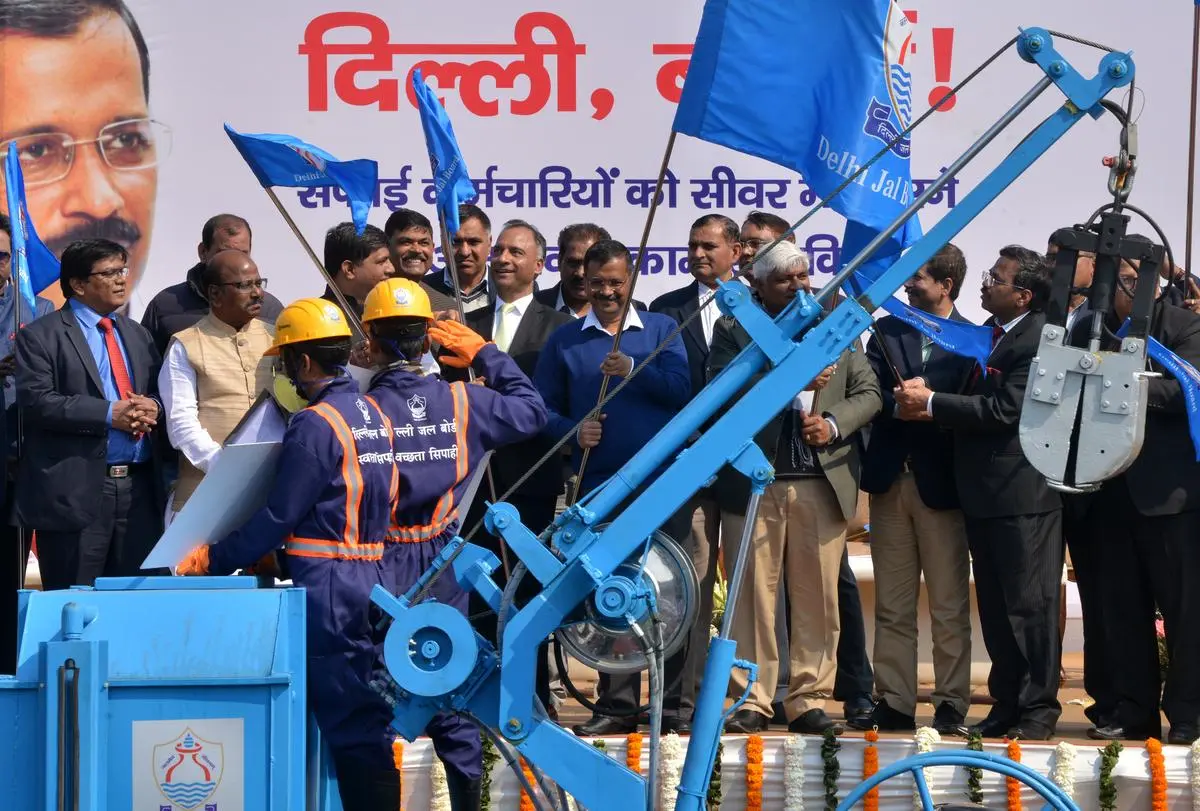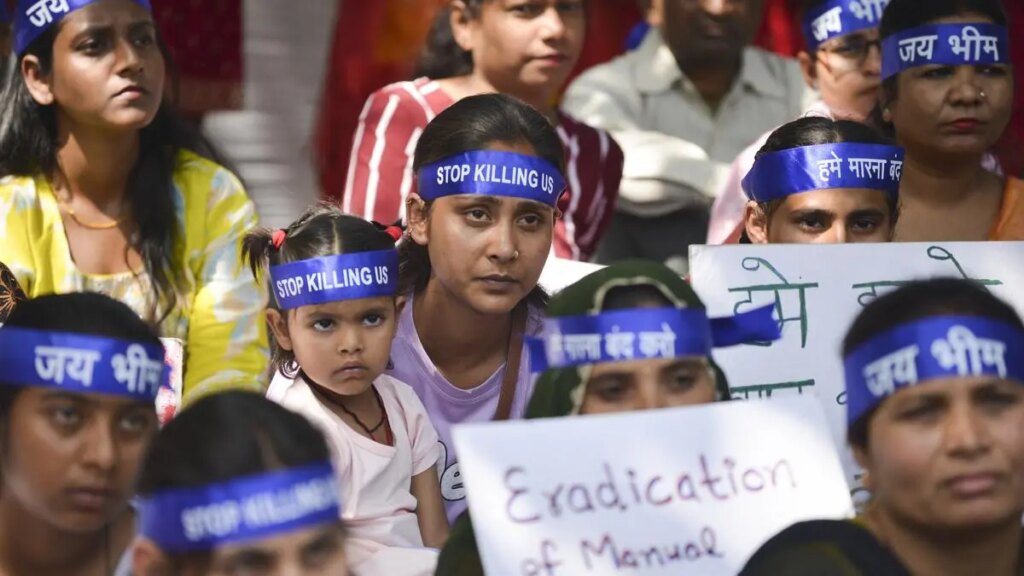Panth Lal Chandra, 43, migrated to Delhi from Chhattisgarh, hoping for a better livelihood. What he instead found himself doing in the capital was the dehumanising practice of manually cleaning sewers. On March 16, Chandra descended into a clogged manhole in the posh New Friends Colony in south Delhi. He had no protective gear on, fell unconscious as he inhaled the toxic fumes from waste, and passed away.
Ten days later, workers and activists gathered at Jantar Mantar at a protest meeting organised by the Safai Karamchari Andolan, a national movement to eradicate the practice of manual scavenging, started in 1997 by Magsaysay awardee Bezwada Wilson. “Mauton ka hisaab do, Modi sarkar! Humein maarna band karo! (Give us an account of these deaths, Modi government! Stop killing us!), the protestors chanted.
Manual scavenging was outlawed in India under The Prohibition of Employment as Manual Scavengers and their Rehabilitation Act, 2013; but despite the law, sanitation workers continue to be forced into hazardous cleaning, which involves the manual cleaning of sewers and septic tanks without the mandated safety gears or protective measures, often under exploitative contractual arrangements. While the Act bans hazardous cleaning, there is no specific ban on manual cleaning of sewer and septic tanks as long as protective gear is given.
But the deaths from this hazardous practice continue to snuff out lives: 377 people died between 2019 and 2023 while cleaning sewers and septic tanks (according to Ramdas Athawale, Minister of State for Social Justice and Empowerment); and in Delhi alone, more than 72 people died in sewer-related deaths between 2013 and 2024 (according to the National Commission for Safai Karamcharis). Activists say these numbers are a severe undercount.
Contractualisation provides loopholes
The protest, led by sanitation workers and activists from Safai Karamchari Andolan comes just days after Delhi Chief Minister Rekha Gupta presented the budget (on March 25), allocating Rs.500 crore for repairing and developing sewage treatment plants, Rs.250 crore for replacing old sewer lines, and another Rs.250 crore for improving water treatment plants across the city. To strengthen sewage management, Rs.20 crore has been allocated for purchasing machines to improve mechanically remove sludge and blockage. The Delhi government has also requested Rs.2,000 crore in financial assistance from the Centre to modernise the capital’s water and sewage infrastructure.
Also Read | The continuing shame of manual scavenging
Despite these financial commitments, contract workers say their working conditions remain dangerous: no safety gear and complete government apathy towards deaths in sewers. Activistssuch as Bezwada Wilson argue that funds are allocated on paper; sanitation workers are not even recognised as “workers”—they are treated as disposable, contractualisation continues, and they are forced into the most hazardous conditions, with no state accountability. And they continue to die.
The Delhi Jal Board (DJB), the nodal state agency responsible for the management and maintenance of water and sewage lines in Delhi, has distanced itself from the March 16 death, claiming that the deceased worker was neither employed by them nor working under a contractual arrangement with the Board.
This pattern of denial is not new. The DJB does not see sanitation workers—particularly those hired through contractors—as its responsibility: the outsourcing of sewer cleaning to private agencies absolves the board itself of direct liability. According to fact-finding exercises conducted by Dalit Adivasi Shakti Adhikar Manch (DASAM), at least eight sewer worker deaths have been recorded in Delhi in the past three to four months alone. Yet, the government refuses to acknowledge these as deaths due to manual scavenging; this is a failure to recognise the workers as their own, and sidesteps the legal and financial responsibilities that come with such recognition.
Suraj Lohar was hired as a security guard in Delhi, but he was made to work as a sewer cleaner. When he died in November last year, authorities refused to recognise him as a sanitation worker in the chargesheet, making it nearly impossible for his family to seek justice. This deliberate misclassification of workers—as security guards, daily wage workers, or temporary hires—ensures that their deaths remain unaccounted for, reinforcing a system where their work, and death, remains invisible.

Delhi Chief Minister Arvind Kejriwal flagging off the Sewer cleaning machines for cleaning sewers in narrow lanes in New Delhi on February 28, 2019.
| Photo Credit:
R.V. Moorthy/ The Hindu
Contractualisation, which remains unchecked, means that most workers who descend into Delhi’s sewers are mostly poor migrant workers or daily wage workers, lured by desperate economic circumstances into hazardous jobs that offer little pay and no legal protection. “There is a nexus of police and private contractors, making it difficult to track migrant workers. When someone dies, their bodies are often sent back to their villages quietly”, revealed Sanjeev Danda from DASAM.
During the March 16 incident, the two survivors—both migrants—were initially admitted to AIIMS but were allegedly sent away once the case gained media attention.
Most sewer workers in DJB are hired through private contractors. The DJB issues tenders online, and contracts are awarded to the lowest bidder. These private companies then recruit labourers, but only on a contractual basis. The workers’ contracts mention only the private contractor, not the fact that they are engaged in DJB work.
“If something happens to us, the DJB says we don’t work for them, and the contractor tells us to go to the DJB. We have no identity, no proof of employment,” said Virpal, a contractual worker who has been working as a helper for the DJB’s sewer cleaning machines for the last six years in east Delhi. This lack of documentation means that when someone dies, the families of deceased worker struggle to even prove that their loved one was an employed sanitation worker.
Contractual workers receive abysmal wages and suffer poor working conditions. While permanent DJB employees earn between Rs,16,000-18,000 per month, contractual workers receive half the amount (contractors take a cut). “If someone in my family falls sick, I have to take a loan. If I pay rent, there’s no money left for food,” a contractual worker told Frontline.
“We don’t get our salaries on time; sometimes after two or three months. How do we run our homes?” asked Sanjeev, a worker employed by Smart Green Infra & Logistics Management, a private company that provides sewerage and sewage treatment services and hires workers on contract to operate sewer cleaning machines for DJB. Sanjeev works as a helper for machines introduced in 2019 under the AAP government to eliminate manual entry into the sewers.
Safety equipment is virtually nonexistent. “In my 12 years as a contract sanitation worker with the Delhi Jal Board, I have received no safety equipment. If we ask for boots, they deduct it from my salary,” said one worker. Another added, “No gloves, no medical care—nothing.” Even DJB officials acknowledge this. “Private contractors do not provide necessary equipment, and there are no medical facilities for workers,” a DJB supervisor from East Delhi admitted to Frontline.
Delhi’s sanitation system is divided: Between DJB, municipal corporations, and private contractors. DJB claims that permanent and contractual employees do not enter sewers anymore. “Deaths don’t happen to DJB employees because they don’t go inside; they use machines now. In the last 15 years, no permanent or contractual workers has died,” said Danda. “In the incidents that come to light, the contractors get local labourers, who are often completely unaware of this kind of work, to go into the sewers. As they are hired informally by the contractors, it technically does not come under the DJB.”
This outsourcing creates a bureaucratic loophole where no agency takes responsibility. So, when workers die, DJB says they were employed by a contractor; contractors disappear or blame the worker’s “carelessness,”notes Danda.
Frontline tried to contact the Delhi Jal Board, but did not receive a response.
In 2018, the Delhi government introduced mechanised cleaning to eliminate manual scavenging. However, activists say that the initiative has stalled. “The Kejriwal government brought machines in 2018, but after that, no new machines have come,” said Ashok Taank of DASAM. “There were complaints that the large machines couldn’t enter congested lanes, so there was a demand for smaller machines. They arrived, but were later stopped.”
Heart of crisis: Caste
At the heart of this crisis lies caste. Most sewer workers belong to the Valmiki community, a historically oppressed caste forced into sanitation labour for generations. “When we go to sites, people won’t even give us water. If they do, they place it at a distance,” said Jaishankar, a worker in northeast Delhi.
Also Read | Bezwada Wilson: ‘Clean your mind, not our feet’
Caste hierarchy is entrenched within the sanitation department, the DJB supervisor explained. “There is an unsaid system of working and non-working staff in the sanitation department. If I am an SC, I will do the sewer cleaning work. People from all castes will be employed in the department, but only we will do the actual work. It is as if we are made for this work. It is not written, but it is understood,” he said. “It is the same for me: I am educated, I am at the same level as them. But they sit in the office. Why would they go to the field? He will smell bad.”
Today, workers and activists are demanding an end to contractualisation. “Remove the middleman,” said the DJB supervisor. “Why can’t the DJB pay workers directly? The only demand of workers is equal work, equal pay, and equal rights,” the supervisor added. He pointed out that in NDMC, where there are fewer contractual workers, salaries are significantly higher. “In NDMC, even a fourth-class employee earns Rs.1.5 lakh, but we earn only a fraction of that despite doing the same work.”
It is indeed shocking that that despite the Prohibition of Employment as Manual Scavengers and their Rehabilitation Act, 2013, workers continue to be sent down toxic, life-threatening sewers without the legally mandated safety gear. Until the government enforces the law, Delhi’s sewer deaths will continue.
Source:https://frontline.thehindu.com/society/delhi-sewer-deaths-manual-scavenging-contract-labour/article69396866.ece

